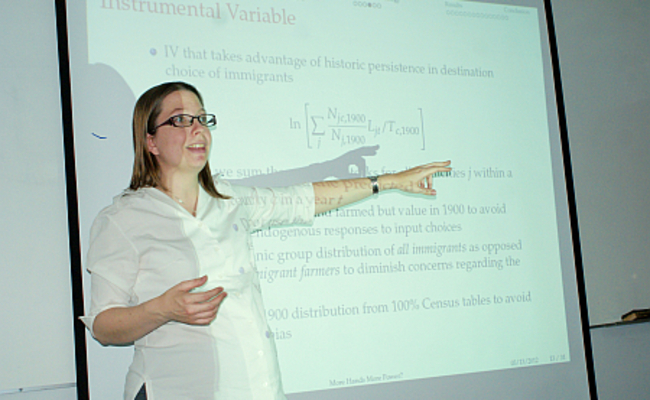Seminario Académico - People and Machines: A Look at The Evolving Relationship Between Capital and Skill In Manufacturing 1850-1940 Using Immigration Shocks
Fecha de inicio: 11 de Junio de 2014, 13:00 hrs.
Fecha de término: 11 de Junio de 2014, 14:00 hrs.
El Seminario se realizará el miércoles 11 de junio de 13:00 a 14.00 hrs, en la Sala P-308 Tercer Piso del edificio Placa de FEN
Fuente - Facultad de Administración y Economía, USACH
El Departamento de Economía de la Universidad de Chile tiene el agrado de invitar a usted a un nuevo Seminario Académico:
Título - People and Machines: A Look at The Evolving Relationship Between Capital and Skill In Manufacturing 1850-1940 Using Immigration Shocks
Autores - Jeanne Lafortune (Pontificia Universidad Católica de Chile), José Tessada (Pontificia Universidad Católica de Chile) Ethan Lewis (Dartmouth College and NBER)
Presenta - Jeanne Lafortune (Pontificia Universidad Católica de Chile).
Abstract - Like today, workers of the nineteenth and early twentieth century United States were buffeted by shocks derived both from major innovations in manufacturing production technology and large waves of immigration. This paper investigates these phenomena together.
Using tabulations of the U.S. Manufacturing Censuses taken between 1860 and 1940, detailed by industry and county/city, we ask how manufacturing inputs and outputs responded to immigration-induced changes in skill mix in the local area. The response reveals both the impact improvements in technology had on the demand for workers of different skill levels at different times and also how the large waves of immigration were absorbed by the labor market during an era when production possibilities may have differed from modern times.
We find that, first, in urban counties immigration significantly shifted skill ratios. Second, we find that capital substituted for skill in the nineteenth century: capital intensity within industry is significantly negatively correlated with immigration-driven increases in the share of workers who are skilled. Our estimates are also consistent with capital becoming more skill complementary by the early twentieth century. Finally, we find that open economy (industry mix) adjustments had a negligible role in absorbing immigration-induced skill mix changes in this era.
El Seminario se realizará el miércoles 11 de junio de 13:00 a 14.00 hrs, en la Sala P-308 Tercer Piso del edificio Placa de la Facultad de Economía y Negocios de la Universidad de Chile, ubicada en Diagonal Paraguay 257.
